Brave Warrior Read online
BY NEW YORK TIMES BEST-SELLING AUTHOR
ANN HOOD
Grosset & Dunlap
An Imprint of Penguin Group (USA) Inc.
For Delila Dot
GROSSET & DUNLAP
Published by the Penguin Group
Penguin Group (USA) Inc., 375 Hudson Street, New York, New York 10014, USA
Penguin Group (Canada), 90 Eglinton Avenue East, Suite 700, Toronto, Ontario M4P 2Y3, Canada
(a division of Pearson Penguin Canada Inc.)
Penguin Books Ltd, 80 Strand, London WC2R 0RL, England
Penguin Ireland, 25 St Stephen’s Green, Dublin 2, Ireland
(a division of Penguin Books Ltd)
Penguin Group (Australia), 707 Collins Street, Melbourne, Victoria 3008, Australia
(a division of Pearson Australia Group Pty Ltd)
Penguin Books India Pvt Ltd, 11 Community Centre, Panchsheel Park, New Delhi—110 017, India
Penguin Group (NZ), 67 Apollo Drive, Rosedale, Auckland 0632, New Zealand
(a division of Pearson New Zealand Ltd)
Penguin Books (South Africa), Rosebank Office Park, 181 Jan Smuts Avenue, Parktown North 2193, South Africa
Penguin China, B7 Jiaming Center, 27 East Third Ring Road North, Chaoyang District, Beijing 100020, China
Penguin Books Ltd, Registered Offices: 80 Strand, London WC2R 0RL, England
All rights reserved. No part of this book may be reproduced, scanned, or distributed in any printed or electronic form without permission. Please do not participate in or encourage piracy of copyrighted materials in violation of the author’s rights. Purchase only authorized editions.
Text © 2013 by Ann Hood. Illustrations ©2013 by Penguin Group (USA) Inc. Published by Grosset & Dunlap, a division of Penguin Young Readers Group, 345 Hudson Street, New York, New York 10014. GROSSET & DUNLAP is a trademark of Penguin Group (USA) Inc.
Library of Congress Cataloging-in-Publication Data is available.
Illustrations by Denis Zilbur. Map illustration by Giuseppe Castellano.
Design by Giuseppe Castellano.
ISBN: 978-1-101-61085-5
Table of Contents
Chapter 1: Weeping Willows
Chapter 2: Lemonade M
Chapter 3: Penelope Merriweather
Chapter 4: March Madness
Chapter 5: Buffalo
Chapter 6: Attacked!
Chapter 7: Touching the Enemy
Chapter 8: Vision Quest
Chapter 9: Brave Warrior
Chapter 10: Crazy Horse
Chapter 11: Losing The Treasure Chest
Crazy Horse: 1841–September 5, 1877
CHAPTER 1
Weeping Willows
If it can be said that a house mourns, then Elm Medona itself was as sad as Maisie and Felix. Without Great-Aunt Maisie, the rooms seemed darker and duller. The hallways yawned long and forlorn. Even the grounds, which should have been bursting with the first crocuses and daffodils of spring, refused to have the tight purple and yellow buds blossom. Ever since the funeral, it had rained. Hard.
“It’s like the sky is crying,” Felix had said, and even though Maisie had rolled her eyes and muttered, “Now he’s a poet,” she secretly agreed that everything around them was mourning.
Great-Uncle Thorne took to his room and refused to come out. In the two weeks since Great-Aunt Maisie’s funeral, he had taken all his meals in his room and kept his door firmly shut.
“I know what would make him feel better,” Maisie said one night as she and Felix watched the maid carry a silver tray with his dinner out of the Kitchen. Three times a day the cook made Great-Uncle Thorne the exact same thing: croque-monsieur, which was really just a fancy ham-and-cheese sandwich; sliced cucumbers in sour cream; warm potato salad with bacon and mustard; and a single scoop of lemon sorbet with raspberry sauce.
Maisie and Felix were eating grilled cheese-and-tomato sandwiches at the big wooden table that was mostly used for preparing their meals. Since Great-Aunt Maisie died, it had felt too weird to resume eating in the Dining Room. Instead, they wandered in and out of the enormous basement kitchen, leaving half-eaten apples and toast crumbs on the counters.
Felix knew what Maisie meant: a visit to The Treasure Chest. When they went into The Treasure Chest and picked up an object, they traveled back in time. He and Maisie had met Clara Barton, Alexander Hamilton, and Pearl Buck—all of them children, too. But the last time they did it, Great-Uncle Thorne and Great-Aunt Maisie had gone with them. They’d landed in Coney Island at the turn of the twentieth century and met a young Harry Houdini. What Maisie and Felix didn’t know was that their aunt had masterminded the trip, and that she intended to stay there. Staying back in time, they learned, meant dying in the present. And to Felix, that was enough time traveling for the rest of his life. He couldn’t help but feel somewhat responsible for what had happened, and now there was no way to fix it. Great-Aunt Maisie was gone forever.
“You know,” Maisie said, narrowing her eyes at him, “if we go to The Treasure Chest and go back in time, it makes Great-Uncle Thorne healthier. If we don’t…”
She let her voice trail off so that Felix could fill in the blanks himself.
“He’ll get older and frailer,” Felix said. “Which is exactly what’s supposed to happen.”
“But it doesn’t have to happen,” Maisie said. She had a new, annoying habit of dipping her grilled cheese sandwich into mayonnaise, which she did before every bite.
“I don’t think we should mess with the natural order of things,” Felix said, averting his eyes. Mayonnaise made him queasy, and he couldn’t watch his sister eating it on the outside of her sandwich like that.
Maisie dipped the final triangle of her sandwich into the crystal bowl of mayo, licking the drips from it before popping it into her mouth.
“Natural order of things?” she repeated with her mouth full. “Ever since you won class president you talk like a politician.”
“Really? I thought I sounded like a poet,” Felix said.
“Maybe you just sound like a dope,” Maisie said, getting up from the tall stool with a loud scrape against the tiled floor.
Felix watched his sister stomp away. In the past, Maisie somehow had convinced him to do just about anything she wanted, including going into The Treasure Chest that very first time back in the summer. But he was not going to let her talk him into another trip there. He was, after all, president of the class, leading home-run hitter, and in general, a normal, ordinary person. That was good enough for him.
“Must you slam doors all the time?” her mother asked Maisie that night.
The answer was yes. Maisie wanted to stomp, slam, rattle, pound, clank, clump, jangle, crash, smash. Maisie wanted to be heard. But no one was listening.
Her mother stood in a black dress and high heels, wearing too much makeup and holding a shiny black clutch purse, ready to go out yet again with Bruce Fishbaum, the lawyer she worked for and the person whom she spent more and more time with.
“Really, Maisie,” her mother said, “I don’t know why you have to be so noisy.”
“I don’t know why you have to go out with Bruce Fishbaum practically every night,” Maisie said, glaring.
But her mother had already walked to the window, and she peered out expectantly, as if at any minute Bruce Fishbaum would drive up and take her away.
“It’s business,” her mother said unconvincingly. “You know that. I’m lucky the Fishbaums like me enough to have me go to these client dinners.”
Frustrated, Maisie stomped out of the room, across the foyer, and up the Grand Staircase. One good thing about living in a mansion was that when you made a lot of noise, it echoed.
Upstairs, she walked slowly past Felix’s roo
m, which was, of course, empty. Ever since he won the class-president election, he always had somewhere to be: after-school meetings, evening planning committees, socializing with his cabinet. And when he wasn’t doing that, he had baseball practice or pizza parties or a million other dumb things. The phone seemed to always be ringing these days, and the person on the other end was always looking for Felix. Got to run! he’d say to Maisie, and indeed he would run—right past her, his backpack straps flying as he ran out the door into a waiting car filled with friends.
All while Maisie stood and watched.
Maisie could not remember a time when she had been so alone. When they lived in New York just last year (though sometimes it felt to her like that had been a million years ago) they did almost everything together. Their little group of friends had been just that: their friends. No one would have invited Felix over without Maisie; no one would have asked Maisie to do something without Felix. They were a team, a pair, inseparable. One name was never even uttered without the other. MaisieandFelix. As if they were one person.
But somehow, here in terrible Newport, Rhode Island, Maisie had turned invisible. To her class-mates. To her mother. And worst of all, to Felix.
In the distance, Maisie heard Bruce Fishbaum’s BMW pull up. She went into her room, the overly colorful Princess Room, which had been designed for Princess Annabelle of Nanuh, and threw herself onto the bed so hard that it groaned and creaked under her weight. Maisie stared up at the canopy that stretched from one ornately carved post to the other and longed for her twin bed back on Bethune Street with Felix in his matching one on the other side of the scrim.
Their father was an artist who had met their mother when he painted the sets one summer for a theater company in the Berkshires in Massachusetts where she performed. Maisie could list all of the plays: The Sound of Music, The Music Man, My Fair Lady, Hello, Dolly!, and The Odd Couple. She used to look at the programs, proud to see her mother’s name on the cast lists. Her mother had played Marian the Librarian and Liesl and Cecily Pigeon. Starring roles. In her picture in those programs, she looks beautiful, all wide-eyed, her hair tumbling to her shoulders.
Now the sound of voices—Bruce Fishbaum’s deep one and her mother’s fake trill—floated up and Maisie grimaced. How had her mother gone from that fresh-faced, beautiful woman in love with a burly artist to this person? A lawyer in wrinkled suits and kitten heels? Dating someone who wore nautical ties and drove a fancy car?
“Maisie?” her mother called from downstairs.
In such an enormous mansion, even when a person shouted, her voice sounded thin and far away.
“We’re off!”
We’re off? Maisie thought. When had her mother and Bruce Fishbaum become a we?
She jumped off the bed and clomped down the long hallway to the top of the Grand Staircase, arriving just in time to see the giant front doors closing.
“Have a terrible time!” Maisie shouted.
But of course no one heard her.
Bitsy Beal, the queen bee of Felix’s new group of friends, was having a party. A March Madness party. Because, Bitsy said, doesn’t everyone go a little mad in March?
This was exactly the kind of thing Maisie and Felix would hate. Should hate. But in fact, it was all Felix could talk about. Bitsy Beal and her stupid March Madness party. As if Maisie couldn’t be more miserable with her life, now there was this to contend with.
“It’s a costume party!” Felix announced over breakfast, as if this was the most brilliant idea ever.
Their mother was moping over her third cup of coffee, looking as miserable as Maisie felt.
“How fun,” she said, trying to sound enthusiastic but missing by a lot.
“What’s wrong with you?” Maisie asked her.
But her mother just shook her head and gave a small sigh.
“I think I’m going to go as the Mad Hatter,” Felix said, not noticing that everyone around him couldn’t care less.
“What a great idea,” their mother said. She had mascara smudges under her eyes and looked vaguely raccoonish.
“How was your date last night?” Maisie asked.
“We’re just friends, Maisie,” her mother said, staring into her coffee.
“Wait,” Maisie said. “Did Bruce Fishbaum break up with you?”
“You can’t break up with someone who’s just your friend, can you?” she said angrily. With that, she practically ran out of the room.
Felix was writing a list. “I’ll need a top hat,” he said. “Green, I think. And a yellow tuxedo jacket.”
“Seriously?” Maisie said, grabbing the pen out of his hand.
“Hey!”
“All you can think about is your stupid costume for Bitsy Beal’s stupid party? Didn’t you notice that Bruce Fishbaum dumped Mom last night?”
Felix looked around the Kitchen as if he had just realized their mother was gone.
“He did?”
“Yeah,” Maisie said. “Apparently.”
“But that’s a good thing, right?” Felix said. “We don’t like Bruce Fishbaum.”
Maisie blinked at her brother. “What did you say?”
“We don’t like Bruce Fishbaum, do we?” Felix said.
Maisie grinned at Felix.
“Right,” she said.
“All right then. May I have my pen back?”
Maisie handed Felix his pen, still grinning.
“You’re being weird,” Felix said, frowning at his list.
But Maisie didn’t care. He had said it himself. Despite Bitsy Beal and her dumb party and baseball and everything, Maisie and Felix were still a we.
Everyone was surprised that night when, as they sat in the Library eating pizza their mother brought home from That’s Amore, Great-Uncle Thorne appeared in the doorway. With his mane of white hair uncut these past few weeks, and his voluminous white eyebrows pointing in every direction, and his great, drooping white mustache and goatee, and his flowing silk smoking jacket, he took up the entire doorway. In one hand he gripped a walking stick with a shiny silver carved top, and the other hand flailed about like a conductor conducting an orchestra.
“What are you doing?” Great-Uncle Thorne bellowed.
Before any of them could answer, he bellowed some more.
“Eating? Pizza? In the LIBRARY?”
Their mother jumped to her feet, grabbing their plates and unceremoniously dumping their half-eaten pizza slices back into the box, which gaped open on one of the specially carved brass tables Phinneas Pickworth had brought back from India. Or Egypt. Somewhere special and far away.
“We do NOT eat in the LIBRARY!” Great-Uncle Thorne boomed.
“I am so sorry,” their mother was saying as she scurried around, scraping crumbs and wiping at the table.
“That table was made by nomads!” Great-Uncle Thorne continued. “Berbers! Carved in the heat of the Sahara!”
Maisie and Felix stared down at the table, which they had never paid much attention to before. But now Felix saw that there was a story carved there. Intricate camels and men in turbans walking across a desert. Dunes rose behind them. Around the table, where Maisie sat, there were tents and food, a fire with a pot on it, and thin lines of steam etched into the brass.
“Sorry,” Felix said. “It’s beautiful,” he added.
“Of course it’s beautiful, you dolt. Phinneas Pickworth would not carry something that wasn’t beautiful over three thousand miles,” Great-Uncle Thorne said, striding into the room. He looked around, his eyes wild, as if searching for more infractions.
“The Dining Room just seems so empty,” their mother said.
Great-Uncle Thorne frowned down at her.
“I have been waiting for the willow trees to weep for my sister,” he said, his voice finally gentler. “And I have come down to announce that they have.”
“The willow trees are—” their mother began.
“Weeping! That’s what they do. Weeping willows, you ninny.” He shook his
head in disgust. “Maisie was right,” he muttered. “She said you were a bunch of nincompoops.”
“But trees don’t feel anything,” their mother insisted.
“Ha!” Great-Uncle Thorne said. “Come with me.”
He began to walk out of the room, but turned around when he realized they weren’t following him.
“Hup to now,” he said.
Maisie, Felix, and their mother all quickly joined him.
“Willows don’t weep,” Great-Uncle Thorne said incredulously under his breath as he led them out the front doors, across the wide circular driveway, over the damp lawn, to the eastern side of Elm Medona.
There, a line of a dozen willow trees stood. And every one of them seemed bent in grief. Their branches, covered in pale green newly blossomed leaves, brushed the ground beneath them. A slight breeze blew, making the branches sway. The sight of twelve majestic trees mourning stopped all of them in their tracks.
“Listen,” Great-Uncle Thorne ordered.
They listened.
Indeed, the sound of faint weeping filled the air.
“When our mother died, Phinneas said the willows wept for the entire month,” Great-Uncle Thorne said.
Maisie thought it was surely just the wind rustling through the branches that made that sound.
But Felix stared up at the giant trees and believed in that moment that they were actually weeping for Great-Aunt Maisie.
Above the line of willows, a full moon rose. The night was so clear that soon stars littered the sky, twinkling brightly. Eventually, one by one, Maisie and Felix and their mother went back inside, shivering in the March chill. But Great-Uncle Thorne stayed outside, weeping beside the willow trees, long into the night.
CHAPTER 2
Lemonade M
One week before Bitsy Beal’s March Madness party, the weather suddenly turned warm and balmy. Everyone started showing up at school in shorts and polo shirts the color of Easter eggs. That Tuesday morning, Felix appeared in the Kitchen in his old madras shorts and a lavender polo shirt, his backpack slung over one shoulder. On his feet were a pair of Top-Siders, those ugly boat shoes just about everybody in Newport wore, that Maisie had never seen before. He shoved a piece of toast into his mouth and gulped down a glass of orange juice, ignoring Maisie, who watched him the whole time.

 Kitchen Yarns
Kitchen Yarns Waiting to Vanish
Waiting to Vanish Morningstar
Morningstar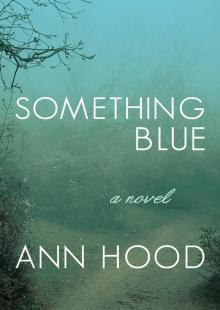 Something Blue
Something Blue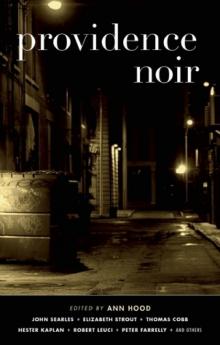 Providence Noir
Providence Noir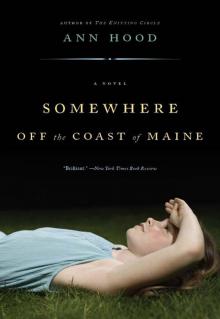 Somewhere Off the Coast of Maine
Somewhere Off the Coast of Maine Jewel of the East
Jewel of the East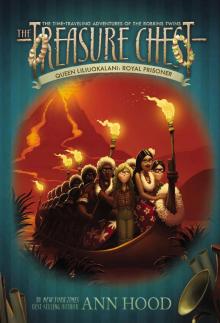 Queen Liliuokalani: Royal Prisoner
Queen Liliuokalani: Royal Prisoner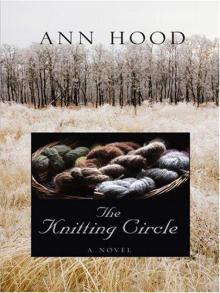 The Knitting Circle
The Knitting Circle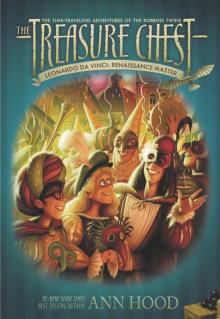 Leonardo da Vinci: Renaissance Master
Leonardo da Vinci: Renaissance Master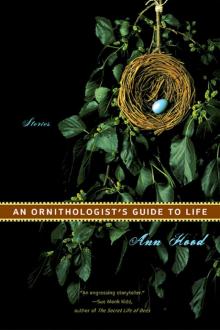 An Ornithologist's Guide to Life
An Ornithologist's Guide to Life The Red Thread
The Red Thread She Loves You (Yeah, Yeah, Yeah)
She Loves You (Yeah, Yeah, Yeah)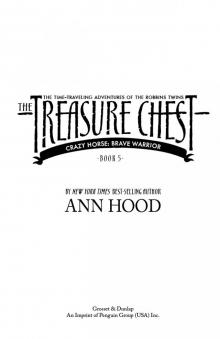 Brave Warrior
Brave Warrior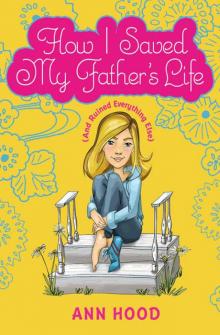 How I Saved My Father's Life (and Ruined Everything Else)
How I Saved My Father's Life (and Ruined Everything Else) An Italian Wife
An Italian Wife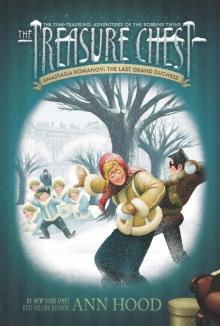 Anastasia Romanov: The Last Grand Duchess #10
Anastasia Romanov: The Last Grand Duchess #10 Prince of Air
Prince of Air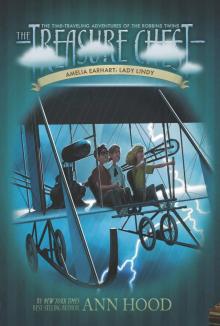 Amelia Earhart: Lady Lindy
Amelia Earhart: Lady Lindy Places to Stay the Night
Places to Stay the Night Little Lion
Little Lion Comfort
Comfort Angel of the Battlefield
Angel of the Battlefield